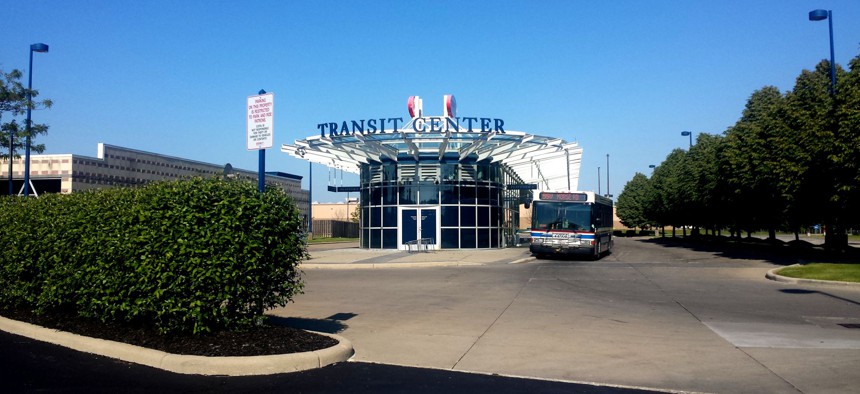Columbus Tops 6 Other Finalists to Win USDOT’s ‘Smart City Challenge’

According to the Columbus' Smart City Challenge plan, the Easton Transit Center will host an autonomous vehicle pilot project. Michael Grass / RouteFifty.com
With additional local investment, $140 million is now committed to the winning plan submitted by Ohio’s capital, but the other finalist cities will be seeing more federal and private assistance to pursue their visions, too.
While the U.S. Department of Transportation hadn’t yet officially announced the winner of the first-ever Smart City Challenge, there was plenty of excitement in Columbus on Tuesday afternoon with news, reported by The Columbus Dispatch, that Ohio’s capital came out on top among six other finalist cities with its plan to improve local mobility through investments in connected transportation technologies.
Through the Smart City Challenge, the USDOT pledged $40 million—subject to future appropriations—to the winning city’s plan. Seattle-based Vulcan Inc. committed an additional $10 million to the winning city.
On top of that $50 million, local stakeholders—including Ohio State University, Battelle, American Electric Power, Honda and IBM—said they would add $90 million if Columbus was selected. Combined, that’s $140 million in smart cities investment that eventually will be heading to Ohio’s largest city.

As Route Fifty previously profiled, much of the Columbus Smart City Challenge plan is built around its forthcoming CMAX bus rapid transit line along the Cleveland Avenue corridor.
The plan also calls for the use of smart transportation technologies to better connect bus-reliant residents of a neighborhood along that corridor—an area with high levels of poverty and infant mortality—to public services, including medical facilities.
An autonomous vehicle pilot project has been envisioned to shuttle bus commuters between the suburban Easton Transit Center and nearby jobs. Other corridors for future investments connect downtown Columbus to Port Columbus International Airport and the Rickenbacker Inland Port.

“This funding is a game changer for the City of Columbus and central Ohio,” U.S. Sen. Sherrod Brown said in an announcement on the Smart City Challenge win released on Tuesday. “I’m glad the Department of Transportation recognized what so many of us already know—Columbus is a smart city that deserves to win this challenge.”
Columbus City Hall declined to comment on the apparent big win for Ohio’s capital city on Tuesday evening.
While the USDOT hasn’t officially announced the winning city, it did release a statement Tuesday saying that it would continue to assist the other finalist cities—Austin, Denver, Kansas City, Pittsburgh, Portland and San Francisco, all profiled recently by Route Fifty—to pursue the plans laid out in the Smart City Challenge plans.
“Each of our finalist cities has demonstrated incredible vision and creativity in developing meaningful plans to use technology to improve the lives of their citizens and create a truly smart city,” Transportation Secretary Anthony Foxx said in a statement. “There has been a remarkable spirit of cooperation as these cities moved through the competition, and working together with our partners, we are excited to help empower all seven finalists to move forward in creating smart cities.”
Vulcan, founded by Microsoft co-founder and philanthropist Paul Allen, is committing additional assistance to all the finalist cities.
According to the USDOT:
The Department of Transportation will work to identify federal resources for all seven finalists, including providing technical assistance with the Department’s grant and credit programs. Partner and federal agency involvement will include the following:
- Vulcan Inc. will lead the effort to bring in other philanthropists to provide additional funding to support the climate and electrification efforts of all seven cities, and beyond.
- The Department of Energy (DOE) is committed to engaging with all seven cities, as well as other aspiring smart cities, to help cities with transportation system modeling and analysis, data management, and the electrification of their transportation networks. DOE will also engage with the finalist cities on a “technologist-in-cities” program to assist cities in their implementation efforts and facilitate continued engagement with DOE programs.
- The Department of Homeland Security Science and Technology Directorate (S&T) will focus on using technology to reimagine resiliency in the digital age, helping cities improve their disaster response efforts and become more resilient to evolving threats and climate change.
- Consistent with their efforts around the Global City Teams Challenge, the National Institute of Standards and Technology (NIST) will encourage connections to enable the cities to share their ideas and solutions for replicable and measurable smart city transportation systems that go beyond traffic to improve safety and mobility, catalyze economic growth, enable a cleaner and more sustainable environment, and provide an improved quality of life for residents of communities worldwide.
- Most of DOT’s Smart City Challenge partners have also committed to support the seven cities moving forward.
Other private sector partners involved with the Smart City Challenge program include Amazon Web Services, Google's Sidewalk Labs, NXP, Autodesk, and Mobileye.
PREVIOUSLY on Route Fifty: “Columbus Puts Its Bus Rapid Transit Line at Center of Its Smart City Challenge Bid”
Michael Grass is Executive Editor of Government Executive’s Route Fifty and is based in Seattle. Reporter Bill Lucia, based in Washington, D.C., contributed additional reporting. In a previous professional life, Grass worked as a consultant on a post-9/11 Federal Transit Administration emergency preparedness program.
NEXT STORY: City mayors make final pitches in Smart City Challenge






